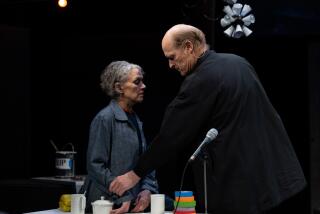Music Reviews : Dresher and Eckert’s ‘Power Failure’ at Wadsworth
- Share via
“Power Failure” is a curiously descriptive title for Paul Dresher and Rinde Eckert’s latest “electric opera.” A big, serious morality play cum rock musical, it is musically and dramatically underpowered at the crisis moments.
There was nothing impotent about the performance, however, Friday at the Wadsworth Theater. The Paul Dresher Ensemble gave “Power Failure” the full advantage of vigor and imagination in its local premiere.
Eckert’s libretto is a cyber-punk fantasy revolving around the greed and megalomania of dying pharmaceuticals executive Charles Smithson and his dotty chief researcher Ruth Lehmann. Their machinations have cost the life of the daughter of Merle Townsend, now a plant security guard who sets a revenge drama in action the night that the cure for all disease is discovered.
The characters--with the rather irrelevant and undermotivated addition of Judith Niles, mousy biographer of Smithson--are all caricatures, but keenly drawn and acted. Their individual histories come together in a night of moral truth-or-consequence when Townsend traps them in an underground laboratory.
Michael Olich’s aluminum and neon set frames the action vividly, and Tom O’Horgan’s direction keeps it apprehendable, moving and sardonically pointed. Eckert’s text balances parody and pathos nimbly enough.
But the climax is a disappointing evasion. Facing his doom, Smithson collapses, and Townsend’s will to revenge evaporates. Lehmann almost incidentally destroys her invention, and “Power Failure” dissolves, with Smithson crooning to himself.
Dresher’s supporting music--much of the text is spoken, including Townsend’s crucial narration--is atmospheric, evoking smoky jazz on behalf of the film noir images or pitting deliberate pop banalities against some of Smithson’s hypocrisies. It drives minimalist repetition with rock energies, backing wide-ranging vocal lines showing influences from Adams to Sondheim.
Each of the characters has a song, usually strophic, explaining past history and current motivation. Though eminently tuneful and stylized, these songs seldom go beyond obvious text-setting.
Each of the two acts culminates in an ensemble of sorts, though not of any psychological depth or polyphonic elaboration. These are the weakest points in the libretto, and Dresher’s music does nothing to aid the cause but rise in manic density and volume.
As Townsend, Eckert dominates the performance with an effortless presence, shifting easily from canny narration to his bumbling office persona to despairing revelations of the inner man. He also sings with grace and power.
Opposite him is tenor John Duykers as Smithson. Duykers manipulates wheelchair and crutches with flamboyant skill, delivering the disintegrating arrogance of the villain with zest, while singing in a strained voice.
Mezzo Stephanie Friedman gives Lehmann a suitably self-absorbed vulnerability, projected with focused, characterful singing. Soprano Thomasa Eckert soars on a wide vibrato into the vocal stratosphere as the deliberately pallid biographer/groupie.
From a command post with keyboard, electric bass and computer, Dresher leads a strong band of four, rounded out by keyboardist Miguel Frasconi, percussionist Gene Reffkin and woodwind player Ned Rothenberg.
More to Read
The biggest entertainment stories
Get our big stories about Hollywood, film, television, music, arts, culture and more right in your inbox as soon as they publish.
You may occasionally receive promotional content from the Los Angeles Times.









